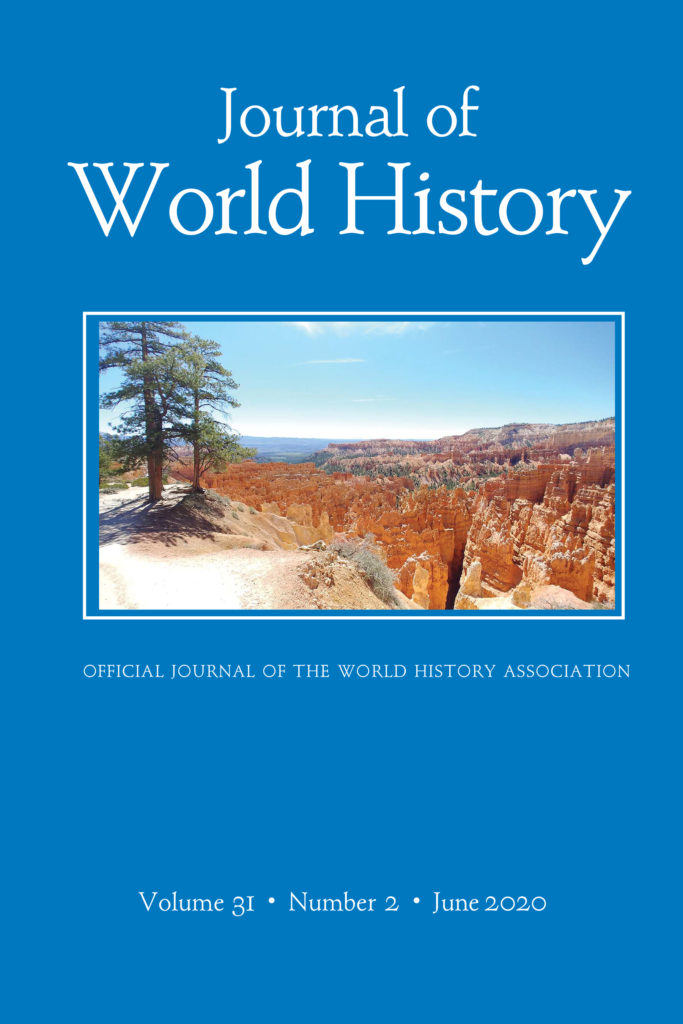The Journal of World History launches its first digital-only special issue, a 30th anniversary collection titled, “Roads and Oceans: Rethinking Mobility and Migrations in World History.” The issue is free on the Project MUSE platform through September 2020.
This week, world history scholars would have been gathering in Salt Lake City, Utah for the annual World History Association (WHA) conference, regretfully canceled in light of public health concerns during the coronavirus pandemic.
This special issue provides accessible resources for scholars and teachers worldwide, pulled together by editor Matthew P. Romaniello. Here, Matt discusses “Roads and Oceans,” a central theme throughout the history of this journal founded by Jerry Bentley, a pioneer in the field who guided the journal through 24 volumes.

University of Hawai‘i Press: Tell us how this special issue came together.
Matthew P. Romaniello: To celebrate the journal’s anniversary, we wanted to highlight a theme that has been important throughout the past thirty years. We reviewed the list of most frequently read articles available through Project Muse and developed three potential themes that would be a good fit. After consulting with a few members of the editorial board, “Roads and Oceans: Rethinking Mobility and Migrations in World History” seemed to best choice to encompass the journal’s history.
UHP: Why is this issue important now?
MPR: As I mention in the introduction, world history is not contained by border crossings or trade caravans but is instead defined by movement in general. Placing this selection of articles into context with each other opens a discussion on the importance of human migration, cultural exchanges broadly conceived, and the challenge crossing borders, either from state-imposed restrictions or geographic boundaries. As these articles highlight, the progress of history has been toward more exchanges, not obstacles.
UHP: How do you hope people will use this issue?
MPR: One of the most exciting opportunities resulting from this special online format is making older articles available free. While many scholars working at the university level will have access to the journal via their institutions, our secondary school colleagues are not so lucky. Getting more material into the hands of secondary school teachers to share with their students is a wonderful outcome of our anniversary celebration. Having a thematic collection available will lend itself to use at all levels as the basis for an in-depth discussion about the importance of migration and travel throughout the past, an issue that’s only more important in a Covid-19 world.
UHP: What was the most challenging thing about creating this issue?
MPR: The greatest challenge was the journal’s rich past. There are simply too many great articles worth highlighting. The editorial board and I debated a few different themes, any of which would have been capable to featuring ten wonderful articles. I’m pleased to say that the UH Press supports the idea of having a new online collection each year, which not only lets us cover a range of themes but also lets us keep sharing this research with a broader audience.
UHP: In lieu of this year’s World History Association meeting, what resources would you point your colleagues to?
MPR: “Roads and Oceans: Rethinking Mobility and Migrations in World History” is one great resource. It’s a chance to revisit the journal’s past and think about how current conditions are changing our ideas about migration and open borders. The World History Association has been producing new content to help with the current conditions with Under the Baobab, an extended conversation about how the pandemic is changing our research and teaching. And World History Bulletin, another official publication of the WHA, has just published a special issue on teaching during the pandemic.
UHP: Finally, how have the closures affected your own research and teaching? How are arranging your work in light of this year’s events?
MPR: Like so many of us, transitioning to full-time online teaching overnight was a huge change, but thankfully I’m getting a handle on our “new normal” by teaching this summer. I had enough time and support from my institution to try some new things and rethink how my courses are structured. For my scholarship, I can only say it’s a great time to be an editor, because all of the work is online so it’s not a dramatic shift. I’m pleased to have a new edited volume, Russia in Asia: Imaginations, Interactions, and Realities, getting published this summer in addition to the new JWH collection. It’s starting up a new research project that’s taken a backseat for the moment, but there is a wealth of online materials to get started with.

Roads and Oceans
Table of Contents
Roads and Oceans: An Introduction
Matthew P. Romaniello
Silk Roads or Steppe Roads? The Silk Roads in World History
David Christian
A Silk Road Legacy: The Spread of Buddhism and Islam
Xinru Liu
Siena on the Silk Roads: Ambrogio Lorenzetti and the Mongol Global Century, 1250–1350
Roxann Prazniak
The Legal Regime of the South Atlantic World, 1400-1750: Jurisdictional Complexity as Institutional Order
Lauren A. Benton
Ages of Sail, Ocean Basins, and Southeast Asia
Jennifer L. Gaynor
Pirates and Kings: Power on the Shores of Early Modern Madagascar and the Indian Ocean
Jane Hooper
The Culture of Culture Contact: Refractions from Polynesia
I. C. Campbell




